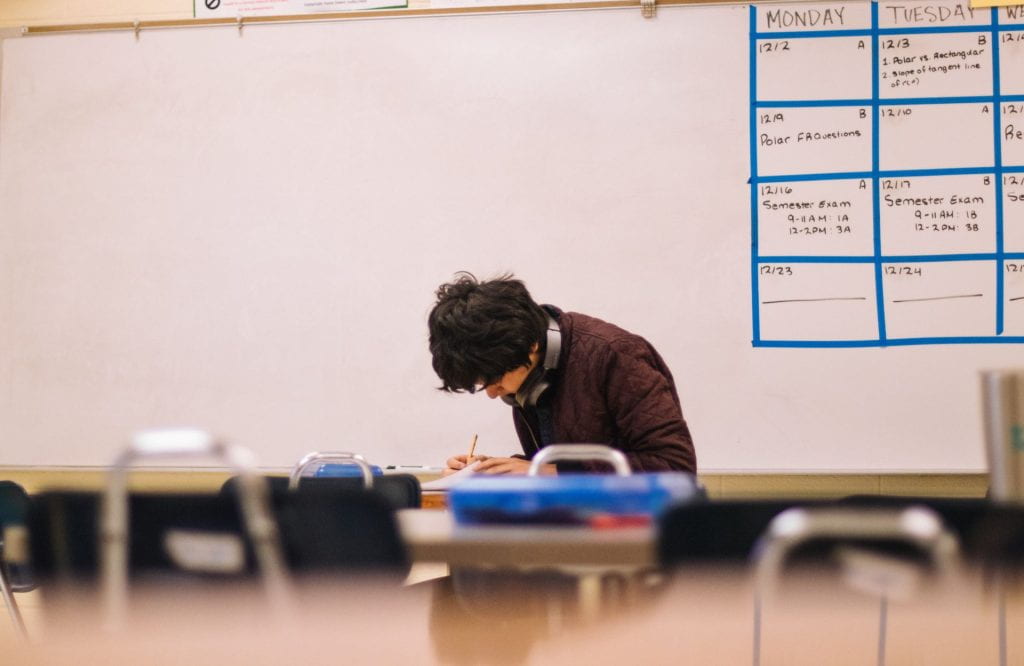BY Lane Kenny
How to Master the Manual
by Lane Kenny

“I grew up driving tractors, so I knew what it was like to drive a clutch,” said Shawn Kenny when asked how he learned to drive a manual. Driving a manual is becoming seemingly increasingly forgotten in today’s society. Many of the younger generation have no idea how to drive a manual. They have been spoiled by the switch to automatic transmissions, and many people are not learning the art of driving. While manual driving is no longer as important as driving, it can be an incredible skill with some essential benefits.
To drive a manual car, press the clutch to the floor with your left foot and then turn on the ignition key. Then, press the brake pedal with your right foot and place the shifter into first gear. Then, you slowly place less pressure on the clutch as you press the accelerator. To shift into the next gear, you must build speed until you need to change into the second gear. To do this, you have to take your right foot off the accelerator while at the same time pressing the clutch with your left foot. Move the gear shifter into the next position and release the clutch as you again press the accelerator. Repeat this process as you build up speed.
While this may seem easy, it can be challenging and it takes time to get the hang of it. One standard error that people make, Kenny says, is that “they let the clutch out too fast, and the car dies. You must time it so that when you let the clutch out and feel it start to die, you must give it more gas. Giving it more gas and letting out the clutch must be feathered into each other.”
Now, one may think that again, with all the automatic cars today, why would one ever want to learn how to drive a manual? To that, Kenny says, “If you rent a car in Europe, where manuals are more popular, you have a lot more choices for driving. Also, knowing how to drive a manual means you can drive any car you want. Also, no automatic transmission is trying to make those shifting movements, so it’s more reliable. You get more fuel efficiency, and it’s more fun. You decide when to shift and downshift. You can accelerate faster and dump the clutch. You control the car.”
Say “Hola” to the Future
by Lane Kenny

Picture AI-Generated by Canva
In the Ames Community School District, foreign language courses are only offered once a student reaches high school. This is different from other schools, as a conversation with an old Spanish teacher revealed that they taught Spanish at a younger age when she lived in Houston. Another conversation with a friend fluent in English from Spain revealed they were also learning English from a young age. A belief was formed that adding a foreign language to the curriculum of younger students in the district would benefit their cognitive, academic, and social skills.

Picture by jariojehuel on Pixabay.com (Link to Image: https://pixabay.com/photos/spanish-learn-speech-translation-375830/)
Students who learn another language at a younger age tend to have higher cognitive capabilities. Studies have shown that those students who have begun learning at an earlier age than high school have outperformed their counterparts on standardized tests. Based on a compilation of research findings and citations done by the NEA, students who have completed four or more years of a foreign language on average scored 100 points higher on each section of the SAT than those who took only a half-year or less in, starting the academic advantages that come from early language exposure.
However, implementing a foreign language curriculum into young students’ schooling can divert time and resources from core subjects such as mathematics and language arts. An overloaded curriculum could lead to slower comprehensive development of essential foundational skills.
According to a study by Garfinkel and Tabor in 1991, there is a high correlation between foreign language study and improved reading skills for children of average and below-average intelligence, highlighting how learning a foreign language at a young age can improve foundational skills.

Picture by geralt on Pixabay.com (Link to Image: https://pixabay.com/illustrations/to-learn-school-language-lessons-2001847/)
Beyond academics, teaching a second language at a younger age opens the door to richer social experiences. By having proficiency in multiple languages, one can have more meaningful conversations and connect with a broader range of people.
It also promotes cultural awareness and competency as age 10 is a “crucial time where students develop attitudes towards other nations and groups perceived as ‘other’ according to the research of Piaget, Lambert, and others” (Curtain and Dahlberg 2004). It gives students insight into other cultures and builds cultural competency, which is vital as they traverse this increasingly globalized world.
The benefits of learning another foreign language at a younger age are numerous, yet many schools only offer it once children reach the high school level. It is time for parents to contact their school districts and push for implementing foreign languages in the elementary and middle school curriculums. Too much good can come from this learning to ignore.
Parents often say they want to set up their children for success in the future. Well, this is a fantastic way to do so.
WORKS CITED
Curtain, Helena & Carol Ann Dahlberg. (2004). Languages and Children: Making the Match: New Languages for Young Learners, Grades K-8. Third Edition. New York: Longman.
Garfinkel, A. and Tabor, K. (1991) Focus on form and meaning: Perspectives of … – wiley online library, Wiley Online Library . Available at: https://onlinelibrary.wiley.com/doi/epdf/10.1111/j.1944-9720.2000.tb00886.x (Accessed: 15 December 2023).
https://portal.ct.gov/-/media/SDE/World-Languag
Why Students Should Learn Another Languages Before Highschool?
| Our school district only offers foreign language courses once students get to high school. This is unlike other schools as I once heard a teacher speaking about how they used to teach it when they were in elementary school as well. I have some friends in Spain who told me that they have been learning a foreign language since they were in their early years of schooling. I think that our school district should implement foreign languages in the curriculum of younger students as it helps to improve both cognitive and social skills. It has been shown in studies that children who learn another language from a young age have higher cognitive abilities. They tend to be better at problem-solving. This is shown through testing as well, as students who began learning another language in elementary school tested better on standardized testing than those students who didn’t. Learning another language also allows people to have more experiences as they are now enabled to have more conversations. They are also able to feel better about their social environment, as they can easily communicate with more people. It can allow them to gain valuable insights into things that would otherwise be lost to them. It can also give them confidence as by speaking another language, they will feel more apt to display that language and speak with others around them. Thus building confidence in their abilities. Learning a new language has many benefits, and it would be better if more students had the ability to learn a language from a younger age. It would help to improve their cognitive and social skills. Also, learning a language from a young age will give them more time to develop it before they get to their adult life, where they may be able to showcase it more. It makes sense to start implementing foreign languages into younger students’ curriculum, and it is something that should be done. |
My First Day of School
My mom casually mentioned to me in the spring of my third-grade homeschool year that I would attend public school. I didn’t think much of it for the rest of the school year and late into the summer. I never thought that I would actually go to public school. But suddenly, in late August, my mom took me to buy school supplies. She showed me the list of things we needed to get before the first day of school at Fellows. I was taken aback. I now realized that going to public school was a reality. I wasn’t mentally prepared at all. The rest of the summer flew by as my fears about beginning life at a new school grew.
I was terrified by the time the first day of school came around. I knew there would be so many people, and I had no idea what they would be like. The unknown scared me. What would they think of me? Would they like me? Can I make friends? These questions were racing through my mind as I was in the car with my mom. I finally arrived, and I was overwhelmed. There were so many rules and places I had to go right away. Teachers and kids were yelling, and I didn’t know what to do. I was terrified.
But then, all of a sudden, I had a change of thought. I decided that I was going to attack the day with confidence. People would like me for who I am, and I would not struggle to make friends. I got to class and sat next to a kid named Kevin Wang. Instead of being quiet and conceited like I normally would be, I started talking to him. We hit it off immediately. We talked and talked all class and the days to follow. We quickly became good friends, and he introduced me to his friends, who soon became my friends. To this day, we are still very close and talk to each other daily.
That sudden change of attitude truly changed my life. If I remained scared and refused to try to talk to people, I would never have made friends with Kevin. And he never would have introduced me to others. I never would have known so many of the people I know today. Knowing these people have had such a profound impact on my life that I never could have foreseen. They have continuously positively influenced me in many ways. Reflecting, I see how facing my fears improved my life. This lesson I learned I have tried to apply to many other facets of my life as well, and just like on that first day, it has impacted my life in countless positive ways. Having courage that day was one of the best decisions I could have ever made, and I will continue to have courage for the rest of my life, knowing that it could only lead to good.
Why is Highschool So Hard in 2023?
By Lane Kenny
Sometimes, when I scroll through Instagram, I occasionally see videos about what high school was like in the 1990s and the 2000s. The old, grainy videos show smiling students interacting with each other in class, the hallways, the lunchroom, etc. They playfully push each other around, confidently talk to the camera, and interact with their significant others. It seems like a joyful environment.

Link: https://unsplash.com/photos/Wx6oQRl7Wa0
I will open up the comments, and they will all say the same thing, “Oh, life was so much better back then; today, school sucks.” And when comparing those videos to what school is like now, it may very well be true.
When looking at the media attention regarding schools, new negative things surround them daily. And when talking to student populations, very few people often praise their school life.
Right now, being a student is challenging for the average teenager. And really, it is not even the academics that are the most taxing part of school for many students. It is the various other components that most people outside of the system don’t even know about. Many believe going to high school is almost all about getting good grades and achieving academic honors. While this is partially true, it is not as vital as many might think.

Link: https://unsplash.com/photos/-hgJu2ykh4E
School is also about developing connections and creating relationships that shape one’s future. This aspect is vital to many high schoolers’ lives because it helps them manage things that will have massive impacts later in life. Creating connections and relationships with people allows high schoolers to find a sense of identity during a time when many struggle with that concept. And how someone molds their identity through their high school years can have massive impacts on how they function years later.
What is mentioned above is a huge problem affecting so many students yearly. They try to please older people by achieving a high GPA and good test scores. And then, they are left alone to manage their fragile and malleable identities during this important phase of life. While some of it is up to the individual to figure out, not all should be done alone.

Link: https://www.pexels.com/photo/elder-sister-and-brother-studying-at-home-3769981/
People need guidance from their elders on how to establish their identity through the connections they make. Students need less pressure from adults to relax and figure out who they want to be. If students are not allowed to do that, it will have terrible impacts on them later in life when it will be too late.
Welcome to Lane’s AP Blog
Hello world!
Welcome to your brand new blog at Edublogs!
To get started, simply visit your blog’s dashboard, edit or delete this post and check out all the other options available to you.
Like more help?
We can walk you through step-by-step in our guide to getting started with your blog.
Happy blogging!